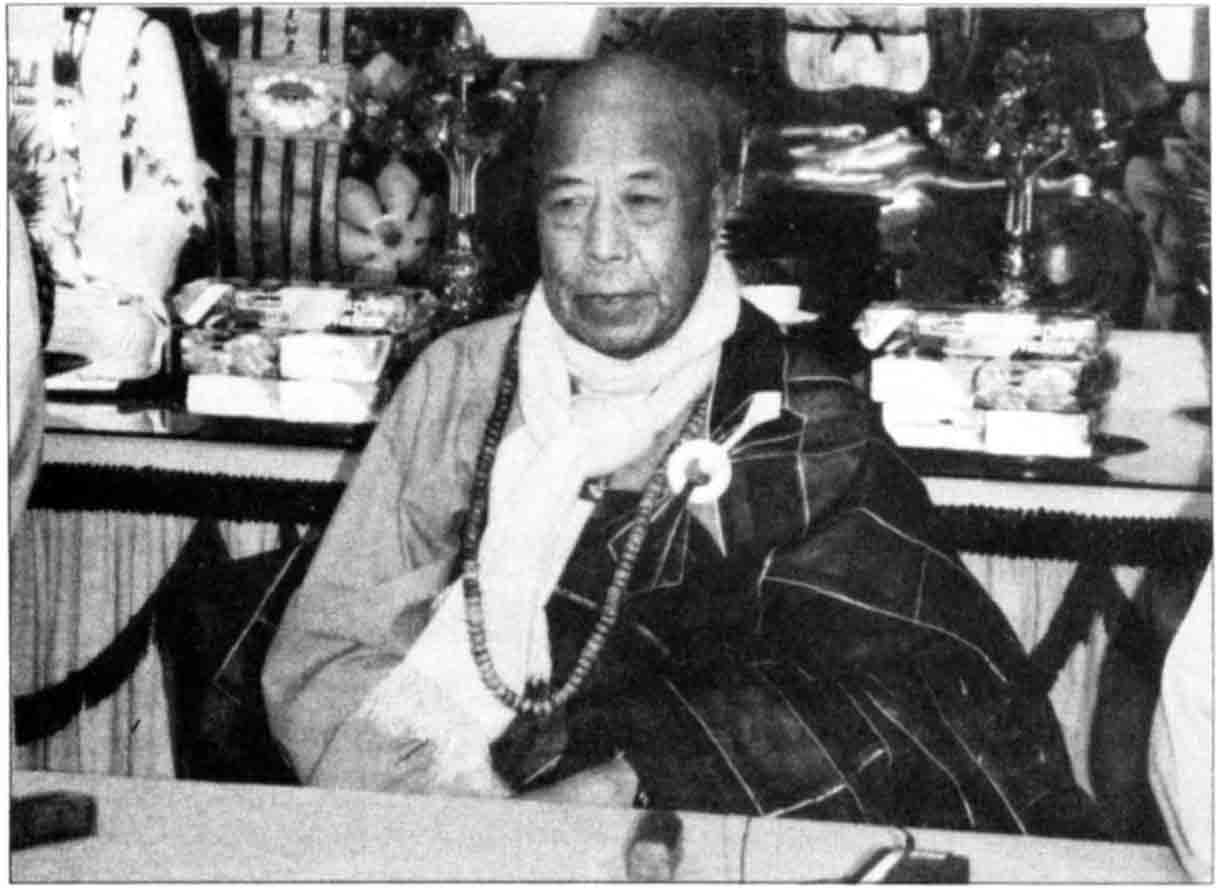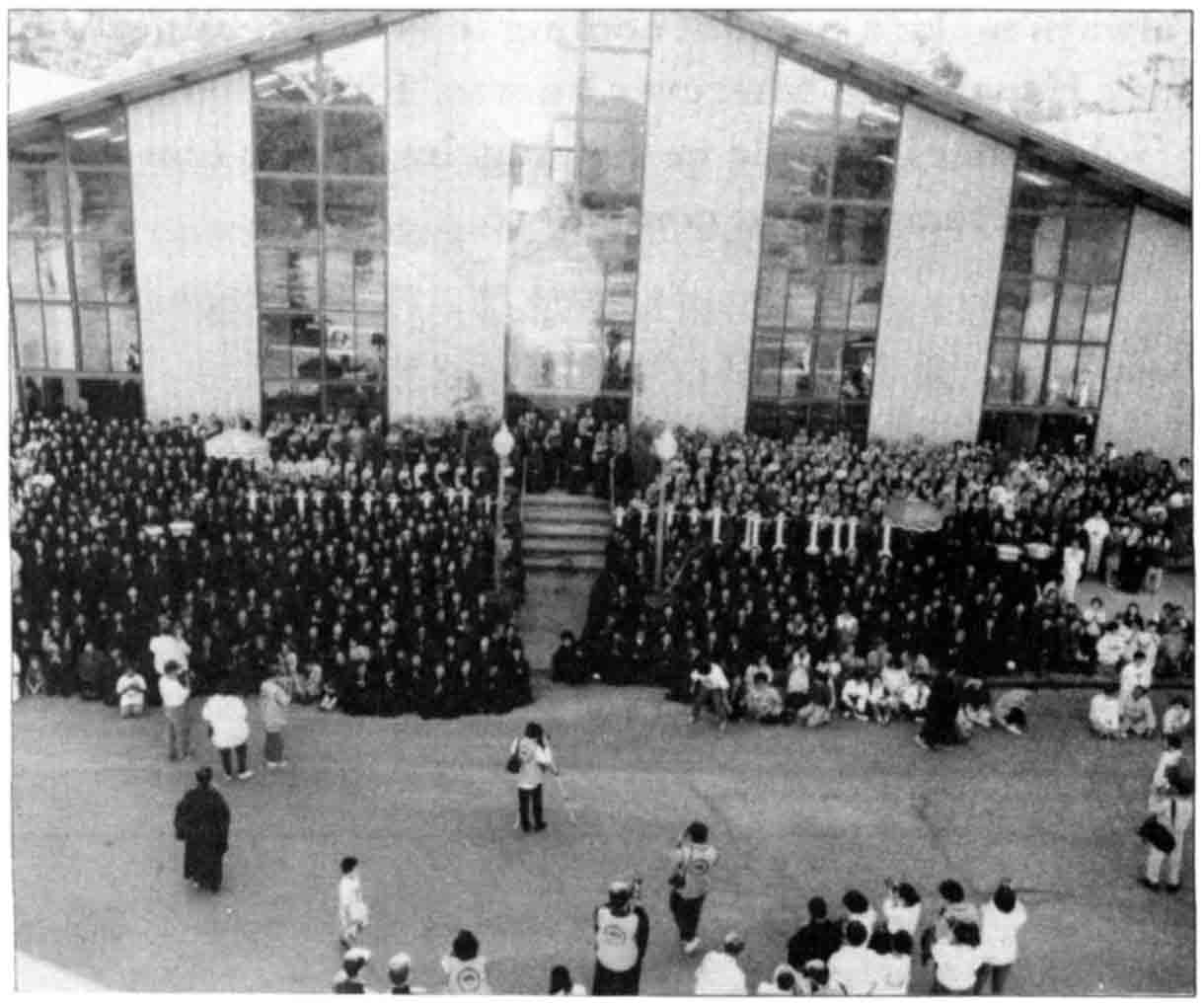|
每次來美國,
我一定要去見一見上人,
不管上人在什麼地方。
他在洛杉磯金輪寺,我就去金輪寺;
在舊金山,我就去舊金山;
在萬佛城,我就去萬佛城。

上人時常教導我們
的,而他自己也正是真理
最真實莊嚴的化身,仍然活生生地在我們眼前。
The Venerable Master always pointed to and was himself
a magnificent
living example of the True Dharma.
一九八九年,我邀請上人到英國訪問。當上人帶領多位出家眾,到永生佛教
中心時,我們感到十分欣悅。雖然中國人在英國定居已有數百年的歷史,但奇怪的是,直到一九八九年,英國還沒有中國的僧侶或寺廟。我們曾到倫敦的中國人社區
裡,尋找佛教團體或寺廟,卻不曾看到一點佛教的跡象。上人慈悲為懷,於一九八九年到英國弘法,此後當地的中國人,也開始對佛教發生了興趣。
我們應該認識到,西方人對出家生活的型態並不太瞭解。不論在美國或歐
洲,對佛教中比丘、比丘尼的概念,非常陌生。可是一旦人們真正瞭解了出家的目的和意願之後,多數人都能尊重出家僧眾的修行。但是,只有少數的大師,能夠激
發西方人來過這種神聖的出家生活。宣公上人就是這樣的一位大師,以身作則,以慈悲心鼓勵西方人,為了自己的解脫,也為了慈悲救度一切有情眾生,去接受佛教
比丘、比丘尼那種嚴謹的生活方式。
我在泰國的師父,也是這樣一位能感化西方人,使西方人認識佛教沙門生活
價值的人。我的師父於一九九二年往生,現在宣公上人也走了,留給我們的是對這兩位大師的回憶;這種回憶,充滿了敬仰和尊崇。今天的追思紀念大會,讓所有認
識上人的人,從世界各地來到這裡,有機會聚在一起,共同追思憶念這位偉人。在追憶這位大師時,我們不應徒然悲傷哀嘆,而應振奮起來,鼓勵自己,立志於自身
的開悟、解脫。我發覺,雖然我的師父和宣公上人都走了,但他們卻為我的出家生活留下了更多的鼓勵和努力的目標。我很感激他們在過去多年,甚至多生中為我們
所做的努力。我們不應忘記,更不應該忽略,而應該觀照、反省,並從中汲取精力、靈感及能力,而成就我們的道業。
能來參加上人的茶毗大典,我深感榮幸。但是我得趕回去,因為現在正是我們結夏安居的時候,我們離開寺廟的時間,不得超過七個晚上。
我跟上人的交往及對上人的懷念,對我來說是十分珍貴的。上人雖已不在
了,但是我們之間的聯繫以及僧團間的相互尊重,卻不斷地增長。和這兒的出家人交談以後,我相信我還會回到萬佛城來。希望你們大家能自在地持戒修行,能從自
私、妄想、一切欲望和所有的痛苦中解脫出來,早證涅槃。
上人是真理最真實莊嚴的化身
一九九五年七月二十七日
我想從西方佛教的立場,向上人表示感恩。他老人家一生
中給我們的啟發及奉獻,這正是亞洲給西方世界最大的禮物。這些聖人來到西方,讓我們分享他們的智慧,我想這樣慈悲的奉獻,是沒有人可以相比的,這也可以說
是「最好的國際支援」,我會永遠懷念、珍惜這一切。
今天早上去瞻仰上人之後,我心中突然明白了為什麼上人常說:「我就是一
個活死人。」因為真實法本來無生無滅,雖然從感官、從世間的立場來看,我們說上人圓寂了。但是我們所尊崇的真理––這是上人時常教導我們的,而他自己也正
是真理最真實莊嚴的化身,仍然活生生地在我們眼前。最後,我想再一次向上人表示感激,他老人家給我們歐美西方世界這份最大的禮物。
|
|
Whenever I would come to the
United States, I always make a point of coming to see Venerable Master
Hsuan Hua
wherever he was. I would go to the Gold Wheel Temple in Los Angeles, to
the temple in San Francisco, or come here.
In 1989, I invited the Venerable Master to
England, and when he arrived at our monastery of Amaravati with a
retinue of Bhikshus and Bhikshunis, we were very delighted and pleased.
Strangely enough, though the Chinese community has existed in Britain
for several hundred years, in 1989 there were no Chinese monks or
Chinese temples in England. I remember searching in London, trying to
find, in the Chinese community, any sign of a temple or Buddhist group.
We could hardly find anything that you could call Buddhism among the
Chinese community in Britain. It was greatly compassionate of the
Master to come to England at that time, because now there is definitely
a renewal of interest in the practice of the Dharma among the Chinese
community.
It’s very important to recognize the monastic form
as something that is not understood very well by Western people. Both
here in America and in Europe, the idea of a Buddhist monk or nun is
considered very strange. Once people really understand the purpose and
intent of our life, most people respect what we’re doing. But there are
very few Masters that inspire Westerners to live the holy life in the
monastic form. The Venerable Master Hsuan Hua was one of these great
teachers who by his own example and his own compassion could encourage
and inspire Western people to take on the restraining life of the
Buddhist monk and Buddhist nun and to live it for liberation and for
compassion, for liberating all sentient beings. My teacher in Thailand
was also one of these great beings who could inspire Western people to
see the value and the beauty that lies in living the life of the
Shramana [Buddhist monastic].
In 1992 Ajahn Chah died, and now the Venerable
Master Hsuan Hua has died, and what we have is the memory of both these
great teachers. This memory is something to respect and honor. A
ceremony like this gives all of us who have known the Venerable Master
or heard of him an opportunity to come together. All of us from various
parts of this planet have assembled together at this time and place to
honor the memory of this great being. The memory of a great
teacher—instead of seeing it in terms of grief and sorrow and loss—is
something to inspire us, to awaken us, to encourage us, towards our
aspiration for liberation and enlightenment in our own lives. I find
that even though Venerable Ajahn Chan has died and now the Venerable
Master Hsuan Hua has died, this gives me even more encouragement and
purpose in my monastic life, because I appreciate all that they’ve done
for all of us over the many years and probably many lifetimes. This is
not to be just dismissed and ignored, but to be contemplated and
reflected upon to give us that extra energy and inspiration and the
ability to fulfill our own intentions in our lives as Buddhists.

上人讚頌追思法
會。
The Ceremony in Praise and Recognition of the Venerable Master Hua
|
I want to express my joy at being able to come to
the cremation of the Venerable Master. I have to rush back, because
this is our vassa [summer retreat] time, in which we cannot stay away
from the monastery for more than seven nights. My association and my
memories of the Venerable Master have always been precious to me, and
even though he has passed away, this only increases the bonds and the
respect we feel for each others’ communities. Talking to the venerable
monks here, I don’t feel that this will be my last appearance at the
Sagely City of Ten Thousand Buddhas. May you all be free to develop
this life of moral restraint and of cultivation of the Way, so that you
may be free from all forms of selfishness and self-delusion, all forms
of desire, and all forms of suffering, and that you may all realize
Nibbana.
A Magnificent Living Example of the
Dharma
July 28, 1995
I just want to express the gratitude from the
Western side of Buddhism to the Great Master, who inspired us all and
gave us so much during his lifetime. It’s a great gift from the Asian
continent to the Western world, these venerable sages that choose to
live and share their wisdom with us in the Western world. I think this
kind of gift and great compassion is something beyond compare. It is
what you might call “foreign aid at its very best.” I will always
remember and treasure this.
Also, in reflecting on the body of the great
Master this morning, I had a marvelous insight into the way he would
say he was always living like a dead man anyway. The truth, the pure
Dharma, that which is real and true, was never born and never dies.
Even though the Great Master, in terms of conventions of our language
and our perceptual range, is such that we see Venerable Master Hua as
having died and passed away, what we really loved and respected is
still present with us, and that is the True Dharma that he was always
pointing to and of which he was a magnificent living example. I just
want to say again what gratitude we all feel—here in America and
Europe—for the great gifts that the Venerable Master gave to us.
|